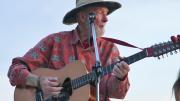Pete Seeger ’40, who dropped out of Harvard in the late 1930s to pursue a lifelong career as a singer and political activist, died on Monday at the age of 94.
An iconic figure in folk music, Seeger as an undergraduate joined the tenor banjo society and studied sociology in the hope of becoming a journalist, but left at the end of his second year to ride a bicycle across New York State. “If he encountered a group of people making music on a porch or around a fire, he added himself to it and asked them to teach him the songs,” wrote Alec Wilkinson in a biography, The Protest Singer: An Intimate Portrait of Pete Seeger. “He was tall and thin and earnest and polite. To eat, he made watercolor sketches of a farm from the fields, then knocked on the farmhouse door and asked to trade the drawing for a meal.”
Awarded the Harvard Arts Medal in 1996 and the American Academy of Arts and Letters Award for Distinguished Service to the Arts in 2012, Seeger performed with Woody Guthrie in his youth and marched with Occupy Wall Street protesters in his nineties, leaning on two canes and leading the protesters in singing “We Shall Overcome.” He wrote or co-wrote such famous songs as “If I Had a Hammer,” “Turn, Turn, Turn,” “Where Have All the Flowers Gone?” and “Kisses Sweeter than Wine.”
In 2008, Seeger joined singer Bruce Springsteen in performing Guthrie's “This Land Is Your Land” at the Lincoln Memorial concert for President Obama’s inauguration. "At some point, Pete Seeger decided he'd be a walking, singing reminder of all of America's history," Springsteen said at the all-star Madison Square Garden concert marking Seeger’s ninetieth birthday in 2009, according to the Los Angeles Times.
For more on Seeger’s career, read Harvard Magazine’s Open Book excerpt from the biography by Wilkinson, published on Seeger’s ninetieth birthday.









